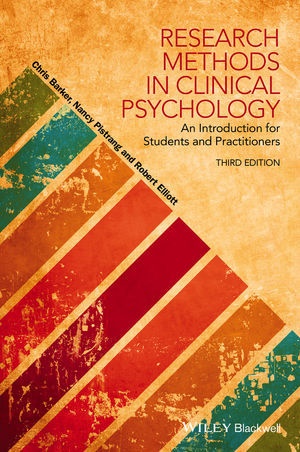Read more
Fully updated to reflect the latest developments, the third edition of Research Methods In Clinical Psychology offers a comprehensive introduction to the various methods, approaches, and strategies for conducting research in the clinical psychology field.
* Represents the most accessible, user-friendly introduction to conducting and evaluating research for clinical psychologists and related professionals
* Ideal for students and practitioners who wish to conduct their own research or gain a better understanding of published research
* Addresses important issues such as philosophical underpinnings of various methodologies, along with socio-political issues that arise in clinical and community settings
* Step-by-step guidance through all phases of a clinical psychology research project--from initial concept and groundwork, through to measurement, design, analysis, and interpretation
* Updates to this edition include new or expanded coverage of such topics as systematic review and literature searching methods, modern psychometric methods, guidance on choosing between different qualitative approaches, and conducting psychological research via the Internet
List of contents
Preface to the Third Edition x
1 Introduction: The Research Process 1
The Research Process 3
2 Perspectives on Research 5
Philosophical Issues 6
What is Research? 6
What is Science? 12
Social and Political Issues 17
Professional Issues 18
The Intuitive Practitioner 19
The Scientist-Practitioner 20
The Applied Scientist 20
The Local Clinical Scientist 21
The Evidence-Based Practitioner 22
The Clinical Scientist 22
The Practice-Based Evidence Model 23
Comparison of Models 23
Implications for Clinical Training 24
Personal Issues 24
Why Do Clinical Psychologists Do Research? 25
Why Don't Clinical Psychologists Do Research? 26
Weighing up the Pros and Cons of Doing Research 27
Chapter Summary 27
Further Reading 28
Questions for Reflection 28
3 Doing the Groundwork 29
Formulating the Research Questions 30
Choosing the Topic 31
Developing the Questions 32
Hypothesis-testing versus Exploratory Research Questions 33
Some Types of Research Question 34
Literature Review 37
The Proposal 41
Funding 44
The Politics of Research in Applied Settings 45
Access 45
Responding to Doubts 46
Authorship 48
Chapter Summary 48
Further Reading 49
Questions for Reflection 49
4 Foundations of Quantitative Measurement 50
The Process of Measurement 52
Domains of Variables 52
Measuring Psychological Constructs 52
Measurement Sources and Approaches 54
Foundations of Quantitative Methods 54
Positivism 55
Psychometric Theory 58
Definitions 58
Reliability 60
Reliability Statistics 62
Validity 64
Generalizability Theory 67
Item Response Theory 68
Utility 69
Standards for Reliability and Validity 70
Chapter Summary and Conclusions 71
Further Reading 71
Questions for Reflection 72
5 Foundations of Qualitative Methods 73
Historical Background 75
Philosophical Background 76
Phenomenology 77
Social Constructionism 79
Families of Qualitative Approaches 84
Thematic Analysis Approaches 84
Narrative Approaches 87
Language-Based Approaches 88
Ethnographic Approaches 90
Ways of Evaluating Qualitative Studies 91
Conclusion: Choosing and Combining Methods 92
Chapter Summary 94
Further Reading 94
Questions for Reflection 95
6 Self-Report Methods 96
Mode of Administration 99
Open-ended and Closed-ended Questions 100
Qualitative Self-report Methods 101
Types of Qualitative Interview 102
Interview Schedule 103
Interviewing Style 105
Quantitative Self-report Methods 109
Questionnaire Design 110
Chapter Summary 118
Further Reading 119
Questions for Reflection 119
7 Observation 120
Qualitative Observation 122
Participant Observation 122
Text-based Research 126
Quantitative Observation 128
Background 129
Procedures for Conducting Observations 130
Reliability and Validity Issues 134
Chapter Summary 135
Further Reading 136
Questions for Reflection 1
About the author
Chris Barker is Professor of Clinical Psychology in the Department of Clinical, Educational and Health Psychology at UCL, UK, where he was formerly the joint Research Director on the Doctoral Program in Clinical Psychology.
Nancy Pistrang is Professor of Clinical Psychology in the Department of Clinical, Educational and Health Psychology at UCL, UK, where she was formerly the joint Research Director on the Doctoral Program in Clinical Psychology.
Robert Elliott is Professor of Counselling at the University of Strathclyde, UK, and Emeritus Professor of Psychology at the University of Toledo, USA. He is a former President of the Society for Psychotherapy Research and former co-editor of the journals
Psychotherapy Research and
Person-Centered Counselling and Psychotherapy.
Summary
Fully updated to reflect the latest developments, the third edition of Research Methods In Clinical Psychology offers a comprehensive introduction to the various methods, approaches, and strategies for conducting research in the clinical psychology field.

